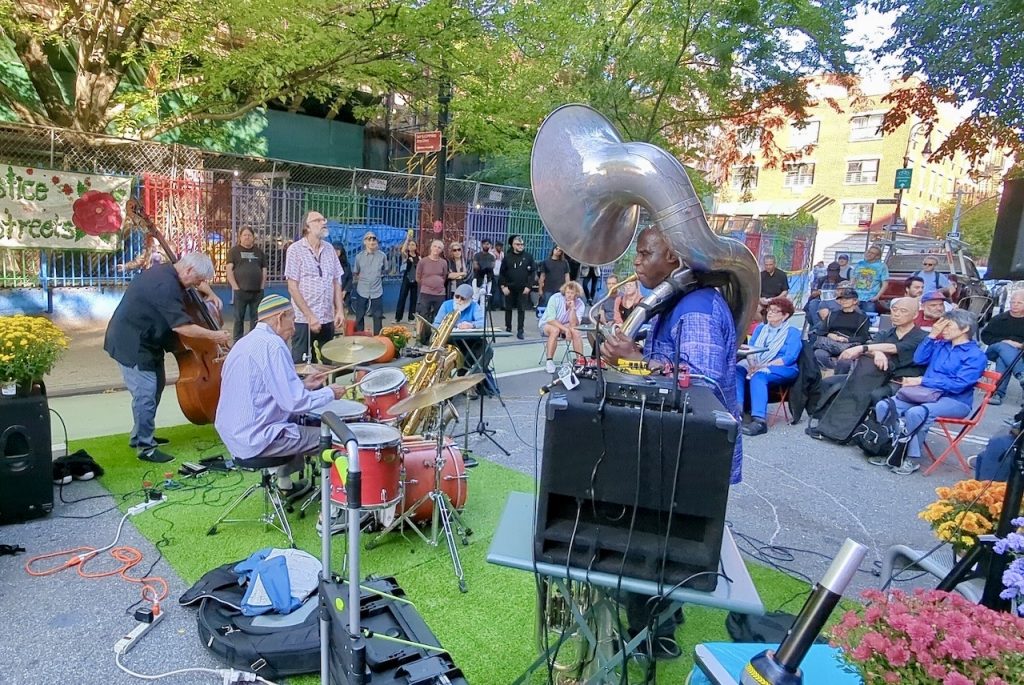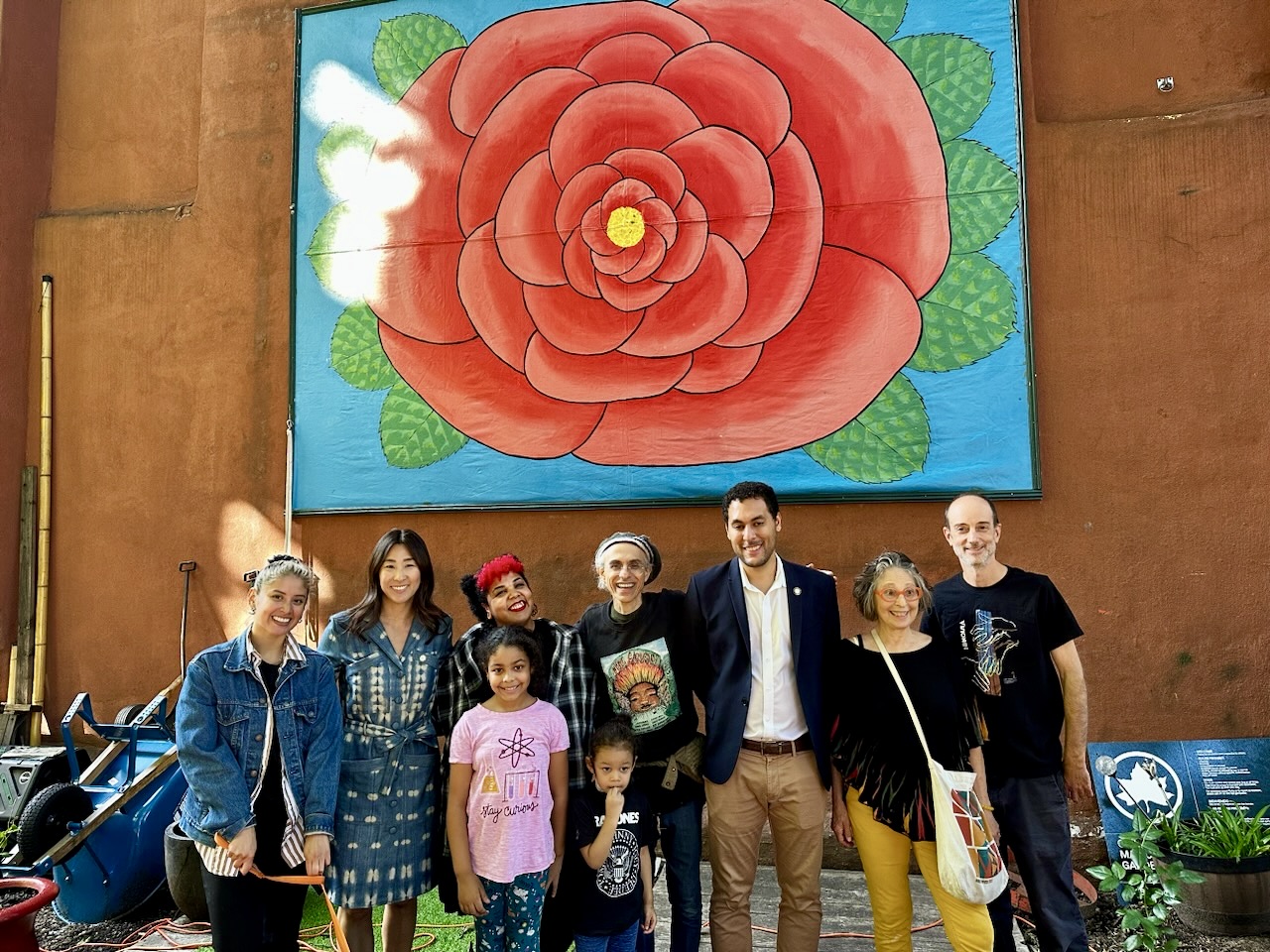BY PHYLLIS ECKHAUS | It’s not magic, but it might be a small miracle: Last week, the Children’s Magical Garden — the embattled and beloved Lower East Side community garden on the corner of Norfolk and Stanton Streets — prevailed against real estate developer David Marom.
The Sept. 30 ruling by Justice Andrea Masley of Manhattan State Supreme Court grants the garden a permanent injunction against Marom. The judge agreed with the garden — and the uncontested testimony of the garden’s arborist — that the developer’s conduct threatens “irreparable harm” to the garden’s rights: specifically, that Marom’s “obstructions and disturbances” could kill the mulberry tree central to the garden.
And the death of the mulberry tree would be a big deal, Masley wrote in her decision, noting, a “40-foot tree falling down on a high-traffic street” is “an imminent threat to the public.”
Justice Masley also took notice of a second risk, that “death of the mulberry tree would destroy other plants and shrubs in the garden.”
Garden president Kate Temple-West described the tree’s importance viscerally: “When you walk in off the street on a hot summer day, it feels like it drops 20 degrees in there.”
“Kids get overheated,” she told The Village Sun. “They need that tree and we were able to prove it supports the whole ecosystem of the garden.”
Masley’s order requires that Marom immediately remove fencing that encroaches on the garden — or face fines of $1,000 a day.
Marom must also pay arborist fees and protect the mulberry tree. With regard to the contested portion of the garden that Marom claims to own, the developer must give 10 days notice before pruning overhead branches or vegetation, plus must use a licensed professional.
Rebecca Bratspies, a CUNY Law School professor and environmental justice scholar, touted the ruling as important.
“This is a big win for the garden, for the tree itself and for respecting the ecosystem,” she said.
“There are a lot of decisions about trees and neighbors fighting over trees,” Bratspies acknowledged. However, she said, it’s “novel and groundbreaking” to have the rights of a community garden — and a tree — “vindicated in court.”

Bratspies also noted the larger context — the ongoing litigation over Lot 19, the plot of Lower East Side land that both Marom and the garden claim to own. The garden’s claim is one of “adverse possession” — title that potentially accrues after 10 years of continuous and conspicuous occupation.
Bratspies teaches that case in her property law class because she relishes what she characterizes as the “underlying dispute” — namely, who owns the city? Does a community garden that revitalized a neighborhood by steadfastly improving abandoned land acquire property rights?
The Children’s Magical Garden was established on abandoned land — full of vermin, garbage and used needles — 40 years ago.
Developers have sought to profit. Ten years ago, a developer forcibly laid claim to Lot 19, putting up a fence and spurring litigation.
Nine years ago, Marom bought that developer’s disputed claim for $3.35 million. He, in turn, declared plans to bulldoze that part of the garden and build a seven-story luxury residence for himself.
Marom is accused of setting siege to the garden in 2019, dumping rotting garbage and construction debris into it, uprooting plants — accusations Justice Masley found credible given Marom’s willful destruction of evidence, including the e-mails between him and the subcontractor he employed to perform the dirty work.
Gardeners reported watching Marom throw a tantrum in front of children and parents, kicking and overturning garden benches and threatening to overturn a port-a-potty.
In 2019, Marom sought $20 million in defamation claims against an array of garden defenders, from Temple-West to the local P.T.A. president.
Marom’s claims were dismissed under New York’s prohibitions against “SLAPP suits” (SLAPP standing for Strategic Lawsuit Against Public Participation), frivolous lawsuits brought solely to intimidate their targets. New York’s anti-SLAPP prohibitions have also been deployed successfully against Donald Trump.
Temple-West credited the garden’s so-far unbroken string of David-versus-Goliath victories against Marom to the persistent work of Benjamin Burry, an attorney at Bleichmar, Fonti & Auld LLP, his colleagues and his co-counsel at Sidley Austin LLP.
“There’s no way we could have afforded 10 years of hard-fought legal battles without pro bono representation,” the garden president said. “We’re a nonprofit community garden of volunteers. When we need funding, we hold a bake sale.”


I love this story! I have a favorite childhood memory of visiting relatives who had their own magical (or so I considered it) mulberry tree in their yard and the hours I spent under that tree. Justice for a tree — it doesn’t get better than that. Thank you for this wonderful story.
Hooray! A David and Goliath story! I am particularly happy that the Mulberry tree was saved. Fruit trees seem to be on the NYC Parks Department hit list. There was a Mulberry tree on East 23rd Street by the Asser Levy Playground, a peach tree in the Cooper Union park area and a pear tree on East 5th Street that were all cut down. Any tree is important in NYC but let’s celebrate tree diversity and preserve those quirky fruit trees!
What a wonderful story !
Good news and renewed hope for community gardens and inspiration for future battles with heartless landlords
and positive outcomes for the small groups fighting for survival.
It’s about time a garden, and a children’s garden at that, won out over a greedy developer. I wish we could say that for the Elizabeth Street Garden! Really, I hope that somehow, at the 11th hour, Elizabeth Street could win, too.